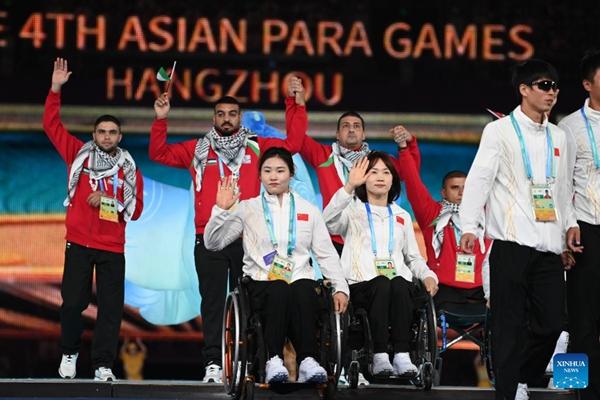Disabled athletes shine at Asian Para Games
 0 Comment(s)
0 Comment(s) Print
Print E-mail China.org.cn , October 31, 2023
E-mail China.org.cn , October 31, 2023
The closing ceremony of the 4th Asian Para Games took place in Hangzhou on the evening of Oct. 28. The city honored its pledge to make both Asian Games equally magnificent through superior event organization. Following several days of fierce competition, a total of 1,573 medals were awarded across 22 major events and 501 sub-events.
Disabled athletes showed their resolve on the field and shared their stories of how sports made their lives more vibrant and gave them a fresh start.

Athletes parade during the closing ceremony of the 4th Asian Para Games in Hangzhou, east China's Zhejiang Province, Oct. 28, 2023. (Xinhua/Jiang Han)
Chinese Taipei para-athlete Tang Chao-han, participating in the Asian Para Games for the first time at age 35, has been engaged in wheelchair tennis for nine years. Prior to a life-altering event, he was a member of his school's volleyball team. In his third year of college, he contracted a severe cold, and the virus attacked his spinal cord, resulting in nerve damage. Consequently, his lower limbs gradually lost function until he could no longer walk. During a low point in his life, he met a seasoned wheelchair tennis player. It dawned on him that people with disabilities could also live independently, engage in sports, and travel freely, much like anyone else. He said, "I'm no different from others; I've just changed the way I move."
Similar to Tang, South Korean lawn bowls para-athlete Lee Mijeong, born in 1968, also encountered adversity at a young age. At 21, she became paralyzed from the waist down due to a surgical mishap, spending nearly 20 years mostly at home. At 40, influenced by her husband, who also played lawn bowls, she took up the sport. "I used to think I couldn't do anything and would have to stay at home. Lawn bowls helped me leave my home and made my personality more cheerful. Since my husband didn't make it to the national team this time, I'll work twice as hard to win the gold medal," Lee said in an interview on Oct. 21. Ultimately, she and her partner clinched a gold medal in a match held on Oct. 27.
Just as Lee Mijeong found her way out of her home through sports, Chinese para-kayaker Xie Maosan discovered a more exhilarating life through sports. Born in 1986, Xie secured the first gold medal for the Chinese delegation at this Asian Para Games. She suffered from childhood polio, which left her with a disability. Before taking up kayaking, she worked as a tailor. In 2008, she was inspired by wheelchair dancing during the Beijing Paralympics on TV, which quietly planted the seed of sports in her heart. At the age of 28, Xie was introduced to kayaking, and since then, her life's trajectory has seen a significant shift. Xie said, "It was sports that changed my destiny." After winning the first gold at this Asian Para Games, she told reporters once again, "Kayaking means rebirth for me and has given me newfound confidence, breathing new life into me!"






Go to Forum >>0 Comment(s)